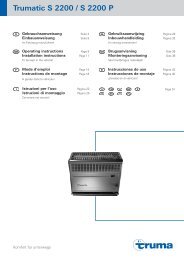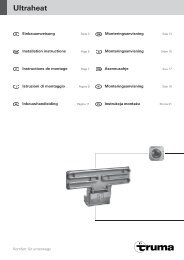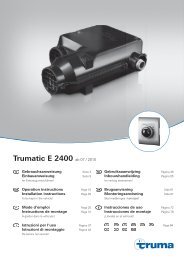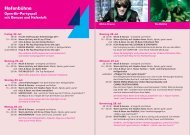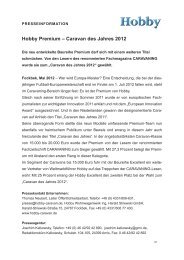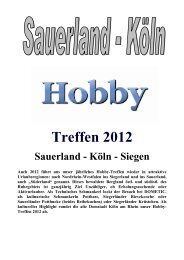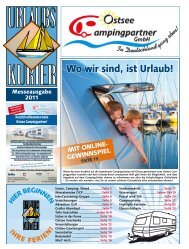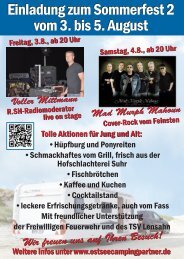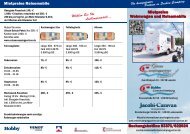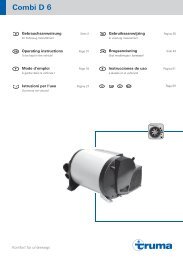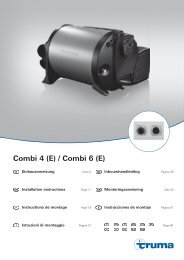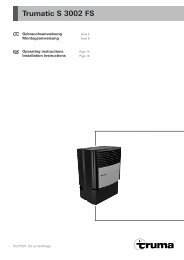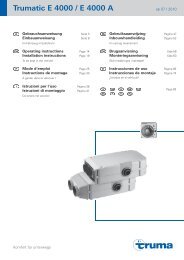Trumatic E 4000 / E 4000 A - Ostsee Campingpartner
Trumatic E 4000 / E 4000 A - Ostsee Campingpartner
Trumatic E 4000 / E 4000 A - Ostsee Campingpartner
You also want an ePaper? Increase the reach of your titles
YUMPU automatically turns print PDFs into web optimized ePapers that Google loves.
14<br />
<strong>Trumatic</strong> E <strong>4000</strong> / E <strong>4000</strong> A<br />
Safety instructions<br />
The use of upright gas cylinders from which gas is taken in<br />
the gas phase is mandatory for the operation of gas regulators,<br />
gas equipment and gas systems. Gas cylinders from<br />
which gas is taken in the liquid phase (e.g. for fork lifts) must<br />
not be used, since they would result in damage to the gas<br />
system.<br />
If the gas system is leaking or if there is a smell of gas:<br />
– extinguish all naked flames<br />
– do not smoke<br />
– switch off the appliances<br />
– shut off the gas cylinder<br />
– open windows and door<br />
– do not actuate any electrical switches<br />
– have the entire system checked by an expert!<br />
Repairs may only be carried out by an expert!<br />
A new O-ring must always be installed after dismantling the<br />
exhaust duct!<br />
Guarantee claims, warranty claims and acceptance of liability<br />
will be ruled out in the event of the following:<br />
– modifications to the unit (including accessories),<br />
– modifications to the exhaust duct and the cowl,<br />
– failure to use original Truma parts as replacement parts<br />
and accessories,<br />
– failure to follow the installation and operating instructions.<br />
It also becomes illegal to use the appliance, and in some<br />
countries this even makes it illegal to use the vehicle.<br />
The gas supply’s operating pressure (30 mbar) must be the<br />
same as the unit’s operating pressure (see type plate).<br />
Liquid gas systems must comply with the legal provisions<br />
of the country in which they are put to use (e.g. for Europe<br />
EN 1949 for vehicles and EN ISO 10239 for boats). National<br />
directives and regulations (e.g. DVGW worksheet G 607 for<br />
vehicles and G 608 for boats in Germany) must be complied<br />
with.<br />
In the case of vehicles used for commercial purposes, the<br />
respective accident prevention regulations issued by the professional<br />
associations are to be adhered to (e.g. for Germany<br />
BGV D 34).<br />
The inspection of the gas system is to be repeated every<br />
two years by am approved liquid gas specialist (DVFG, TÜV,<br />
DEKRA). This is to be confirmed on the corresponding inspection<br />
certificate (G 607, G 608, or BGG 935).<br />
The vehicle owner is always responsible for arranging the<br />
inspection.<br />
Pressure regulating devices and hoses must be replaced with<br />
new ones no more than 10 years after their date of manufacture<br />
(every 8 years if used commercially). This is the responsibility<br />
of the operator.<br />
Liquid gas equipment must not be used when refuelling, in<br />
multi-storey car parks, in garages or on ferries.<br />
During the initial operation of a brand new appliance (or after<br />
it has not been used for some time), a slight amount of fumes<br />
and smell may be noticed for a short while. This can be remedied<br />
by running the heater at maximum output and ensuring<br />
adequate room ventilation.<br />
If the burner makes an unusual noise or if the flame lifts off, it<br />
is likely that the regulator is faulty and it is essential to have it<br />
checked.<br />
Items sensitive to heat (e.g. spray cans) must not be stored<br />
in the installation area, since excess temperatures may under<br />
certain circumstances be incurred there.<br />
Only pressure control equipment that complies with EN 12864<br />
(in vehicles) and EN ISO 10239 (for boats) with a fixed delivery<br />
pressure of 30 mbar must be used for the gas system. The<br />
flow rate of the pressure control device must correspond to at<br />
least the maximum consumption of all devices installed by the<br />
system manufacturer.<br />
We recommend the Truma gas pressure control systems<br />
SecuMotion / MonoControl CS for vehicles and the Truma<br />
gas pressure control systems DuoComfort / DuoControl CS<br />
for dual-cylinder gas systems.<br />
At temperatures of around 0 °C or less the gas pressure regulator<br />
and the changeover valve must be operated using the<br />
EisEx de-icing system.<br />
Controller connecting hoses that meet national regulations<br />
must always be used in the respective country for which the<br />
equipment is destined. These hoses must be checked regularly<br />
for brittleness. Winter-proof special hoses must always<br />
be used if the equipment is operated during the winter.<br />
If the pressure regulator is exposed to weather conditions –<br />
especially on trucks – always make sure to protect the regulator<br />
using the Truma protective cover (standard accessory in<br />
truck attachment kit).<br />
Important operating notes<br />
If the cowl has been placed near or directly beneath an opening<br />
window, the device must be equipped with an automatic<br />
shut-off device in order to prevent operation with the window<br />
open.<br />
The integrity and tight fit of the exhaust gas double duct must<br />
be checked regularly, particularly at the end of long trips. Also<br />
check the mounting of the appliance and the cowl.<br />
Following a blow-back (misfire) always have the ex-haust gas<br />
system checked by an expert!<br />
If appliances are assembled on the outside of the vehicle,<br />
regularly check the flexible air ducts for damage. A damaged<br />
duct could lead to exhaust gas entering the vehicle.<br />
Always keep the cowl for conducting exhaust gas and supplying<br />
combustion air, free from contamination (slush, leaves etc.).<br />
The installed temperature limiter shuts off the gas supply if the<br />
appliance becomes too hot. Therefore do not shut the warm<br />
air outlets and the opening for the returning circulating air.<br />
If the electronic control p.c.b. is defective, return it well<br />
packed. If you fail to do so, guarantee claims shall no longer<br />
be valid. Only use original p.c.b. as a spare part!<br />
Directive 2004/78/EC stipulates that a safety shut-off device is<br />
required if motor homes are being heated while driving.<br />
The Truma gas pressure control systems SecuMotion /<br />
MonoControl CS satisfy these requirements.<br />
If no safety shut-off device (e.g. for the Truma gas pressure<br />
control system SecuMotion / MonoControl CS) has<br />
been installed, the gas cylinder needs to be closed when driving<br />
and appropriate signs must be displayed in the cylinder<br />
cupboard and close to the operating part.



